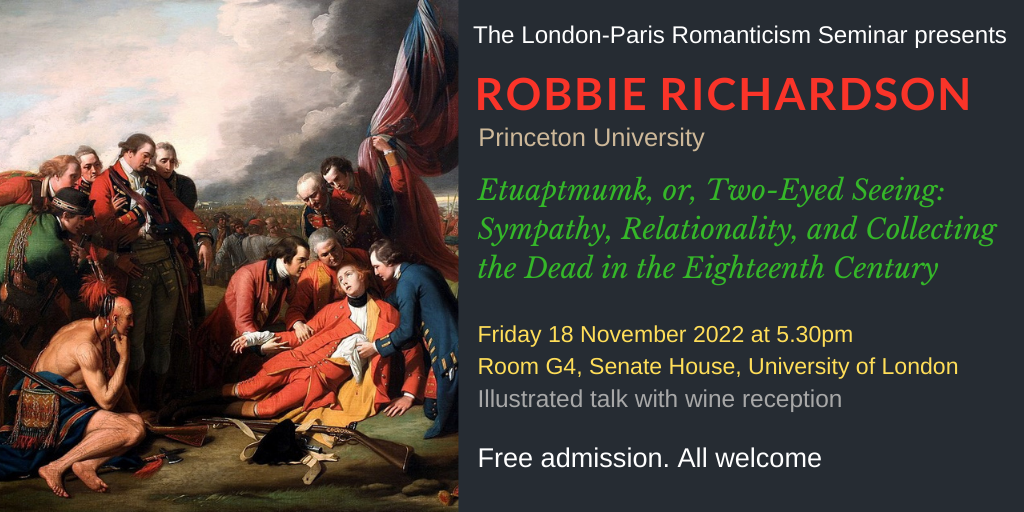
To launch our 2022-23 series, we are delighted to welcome as our guest speaker Professor Robbie Richardson of Princeton University, a leading scholar of eighteenth-century British and transatlantic literature and a pioneer in the field of Indigenous studies. His talk, entitled Etuaptmumk, or, Two-Eyed Seeing: Sympathy, Relationality, and Collecting the Dead in the Eighteenth Century, will take place on Friday 18 November 2022 at 17.30 in Room G4, Senate House (ground floor). An abstract appears below. The seminar, which will include a question-and-answer session, will be chaired by Dr Rowan Boyson (King’s College London). It will be followed by a wine reception to which all are warmly invited.
The seminar is free and open to everyone, including postgraduates and members of the public. There is no need to register in advance. (For those attending hybrid seminars from January, prior registration will be necessary). By holding this first seminar exclusively in person, we hope to reunite with our regular audience who came to seminars in Senate House before we went online during the pandemic. Please rejoin us, or join us for the first time, and pass on the word to others who might be interested. For our international audience who have been attending our Zoom seminars over the past two years, we hope you too can rejoin us from January when we have the technical facilities in place to run hybrid seminars.
Robbie Richardson is Assistant Professor of English at Princeton University. He is the author The Savage and Modern Self: North American Indians in Eighteenth-Century British Literature and Culture (2018), and is currently working on a monograph about European collections of Indigenous material culture from the Americas and South Pacific up to 1800. He has current and forthcoming publications about the European tomahawk and scalping knife trade, the reception of wampum in Britain, and British antiquarian understandings of Indigenous objects and history. He is a citizen of Pabineau Mi’gmaq First Nation in New Brunswick, Canada.
Regarding the topic of his paper, Robbie writes:
‘The European and North American collection of the bones of Indigenous peoples from the Americas and Oceania was largely a nineteenth- and twentieth-century phenomenon, whose painful legacy is still being negotiated today. This paper will consider the earlier origins of this practice in the context of the history of collecting and will look to British understandings of Indigenous funerary traditions and attitudes to death alongside their own attitudes to death, the burials of Indigenous visitors to Europe, and the rise of scientific racism to better understand it. Shakespeare writes in The Tempest about those who, “[w]hen they will not give a doit to relieve a lame beggar, they will lay out ten to see a dead Indian.” How can we understand this impulse, and the future that followed it? This paper will use the Mi’kmaw concept of Etuaptmumk or “two-eyed seeing” in approach, which places Indigenous knowledge alongside European knowledge to generate understanding.’